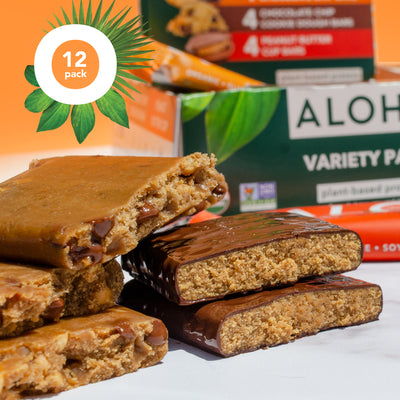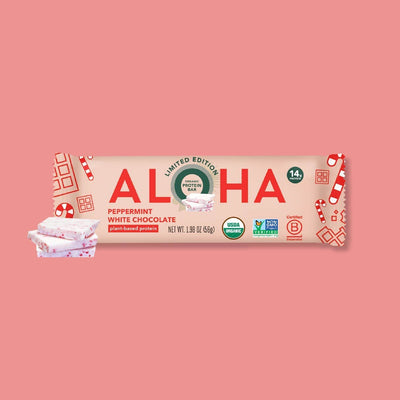Key Takeaways:
- Whole-Fruit Simplicity: Raspberries are naturally rich in flavor and nutrients, making them a valuable addition to a plant-based lifestyle. Their versatility supports a wide range of meals and snacks.
- Clean Ingredients Matter: ALOHA uses real raspberries in its products to keep ingredients honest and organic. Choosing real fruit supports more mindful food decisions.
- Easy to Use Year-Round: Whether fresh or frozen, raspberries are convenient and adaptable in sweet and savory recipes. They’re simple to enjoy, with minimal prep needed.
Why do some of the simplest fruits feel like nature’s secret weapon? Raspberries may be small, but they’re loaded with vibrant flavor and naturally occurring nutrients that quietly work behind the scenes to support everyday eating habits.
At ALOHA, we’re committed to creating food that’s both clean and intentional—made with ingredients that align with your values and your taste buds. We use real raspberries in our plant-based products for their bold flavor and because they represent what we stand for: organic, thoughtfully sourced, and undeniably good.
In this piece, we’re taking a closer look at the potential nutritional value of raspberries and why they’ve earned a place in everyday eating patterns. From antioxidants to essential vitamins, you’ll see how this humble berry offers more than just a sweet bite—it complements a plant-based lifestyle.
What Makes Raspberries Nutritious?
Raspberries are naturally rich in vitamins and minerals that your body uses for daily function. Just a handful contains vitamin C, vitamin K, and minerals like manganese and magnesium.
Raspberries also provide dietary fiber and natural fruit sugars, making them a fruit-forward choice for plant-based meals and snacks. Because they’re low in calories and made up of whole-food components, raspberries are often included in ingredient-conscious diets.
Their bright red color comes from natural plant compounds called anthocyanins, which are part of what gives the fruit its vibrant appeal. With a combination of flavor, texture, and naturally occurring nutrients, raspberries offer a simple way to enjoy real food that feels good to eat.
Health Benefits Of Raspberries
Raspberries are more than just a colorful addition to your breakfast bowl. Their natural mix of nutrients, fiber, and plant-based compounds makes them a smart choice for those who enjoy simple, whole foods. Here’s a closer look at what makes raspberries worth reaching for:
Natural Antioxidants From Plants
The rich red color of raspberries comes from plant-based compounds known as antioxidants. These naturally occurring elements are found in many fruits and vegetables and are often associated with supporting balanced nutrition. Raspberries deliver that signature flavor and visual appeal while adding depth to the fruit’s nutritional profile.
A Simple Source Of Essential Nutrients
Raspberries contain a mix of vitamins and minerals that contribute to everyday nourishment. Vitamin C, for example, is present in notable amounts. Alongside it are smaller amounts of magnesium, vitamin K, and B vitamins that support a varied, plant-forward eating style.
Naturally High In Dietary Fiber
One standout feature of raspberries is their fiber content. Each serving contains several grams of dietary fiber from the tiny seeds and soft fruit flesh. This makes raspberries a useful option for those looking to include more whole-food fiber in their meals.
Easy To Include In Your Routine
Raspberries are incredibly versatile and can be enjoyed in sweet and savory dishes. Whether you prefer them fresh, frozen or gently blended into a smoothie, they’re an easy fruit to keep on hand. Their light texture and naturally sweet taste make them a go-to option for quick snacks or recipe add-ins.
How Antioxidants In Raspberries Help Your Body
Antioxidants are natural compounds in many fruits, and raspberries are especially rich. These compounds interact uniquely with the body, making them a valuable part of a nutrient-diverse eating pattern. Here's how antioxidants in raspberries play a role:
- Naturally Found in Colorful Plant Foods: Raspberries' deep red color comes from anthocyanins, a type of antioxidant found in many red, purple, and blue fruits. The plant produces these compounds to protect itself, and they are carried over to the foods we eat. Choosing colorful fruits like raspberries can be one way to include more of these naturally occurring compounds in your diet.
- Part of a Balanced Nutrient Mix: Raspberries contain more than one type of antioxidant—they offer a mix that includes vitamin C, quercetin, and ellagic acid. This variety adds to their whole-food appeal.
- Work Alongside Other Nutrients in the Body: While antioxidants are often discussed on their own, they interact with vitamins, minerals, and other compounds in support of natural biological processes. Including a mix of antioxidant-rich foods like raspberries is one way to add variety and balance to your plate.
The Role Of Fiber In Raspberries
Fiber is a naturally occurring part of plant-based foods, and raspberries are a surprisingly rich source. Their high fiber content makes them stand out among other fruits, especially when you're aiming to eat more whole, minimally processed options:
- Naturally High in Fiber: A single cup of raspberries contains around 8 grams of fiber, which is considered high for a fruit. This comes from soluble and insoluble fiber, which are naturally found in the berry’s seeds and flesh. The balance of these fibers adds texture and density, making raspberries more than just a sweet snack.
- Part of a Plant-Based Lifestyle: Fiber is one of the key nutrients often associated with plant-based diets, and raspberries offer a simple, enjoyable way to get more of it. They can be eaten independently or added to fiber-rich foods like oats, salads, or smoothies. For anyone looking to include more plant-forward ingredients, raspberries fit right in.
- Supports a Varied Nutritional Profile: While fiber is a standout, it’s just one part of what raspberries offer. Combined with natural fruit sugars and micronutrients, raspberries help add color, texture, and variety to your diet.
- A Fruit with Texture and Substance: Raspberries aren’t just flavorful—they have a unique texture thanks to their tiny seeds and natural fiber content. This texture gives them a satisfying bite, especially when paired with soft or creamy foods like yogurt or nut butter. A subtle but noticeable difference adds variety to plant-based meals and snacks.
Raspberries And A Balanced Plant-Based Diet
A balanced plant-based diet thrives on variety, color, and whole ingredients; raspberries check all those. Their bright flavor and natural sweetness make them an easy addition to plant-focused meals and snacks:
Naturally Fits Into Plant-Based Eating
Raspberries are a fruit that doesn’t need any help to shine. They're naturally plant-based, with no additives or artificial ingredients, making them a simple and clean option for anyone following a plant-forward lifestyle. Whether fully vegan or just trying to eat more plants, they’re an effortless fit.
Pairs Well With Other Whole Foods
This fruit works well alongside other plant-based staples like oats, nuts, seeds, and non-dairy yogurts. You can sprinkle it into breakfast bowls, blend it into smoothies, or enjoy it fresh as a snack. Its versatility helps bring balance and variety to your everyday meals.
Adds Color And Flavor Without The Extra
Raspberries bring natural color and a burst of flavor to your plate—there is no need for syrups, sauces, or sweeteners. They offer a bright contrast in taste and texture, which can elevate even the simplest meals. With raspberries, plant-based eating becomes more vibrant and enjoyable.
Simple Ways To Eat More Raspberries
Raspberries are easy to enjoy and incredibly versatile in the kitchen. Whether building meals from scratch or just looking for a quick addition to your plate, these berries fit right in. Here are a few simple ways to enjoy raspberries more often:
Blend Into Smoothies Or Bowls
A handful of raspberries can add natural brightness and depth to any smoothie or breakfast bowl. Their tart-sweet flavor balances with ingredients like bananas, oats, and plant-based milks. They’re also easy to blend from frozen, which makes them convenient for busy mornings.
Use As A Topping Or Mix-In
Raspberries are an excellent topping for dishes like non-dairy yogurt, chia pudding, or even avocado toast. Their soft texture blends easily, and their bold color makes meals look more vibrant. You can stir them into warm cereals, homemade granola, or baked goods like muffins.
Snack On Them Just As They Are
No preparation is needed—just rinse and enjoy. Raspberries are naturally bite-sized and pack a punch of flavor on their own. They’re a simple, no-fuss snack that works well whether you're at home, at work, or on the go.
Freeze For Later Use
Freezing raspberries allows you to keep them stocked and ready year-round. Once frozen, they can be added to smoothies, fruit sauces, or even thawed and used in baking. Their flavor and texture hold up well, giving you flexibility without waste.
Final Thoughts
Raspberries remind us that eating well doesn’t have to be complicated. Their simple, whole-food nature makes them an easy addition to plant-forward meals and snacks. Whether you're fully plant-based or just aiming for more balance, raspberries offer a vibrant, versatile way to support intentional eating habits.
Read also:
- How Protein Helps Build And Repair Muscles
- Snack Ideas For School: Healthy, Quick, And Easy Options
- Top Benefits Of Vegan Protein Powder
Frequently Asked Questions About Health Benefits Of Raspberries
Can raspberries be part of savory meals, or are they just for sweets?
Yes, raspberries can add a bright contrast to savory dishes like grain bowls, salads, and even glazes for roasted vegetables. Their tartness works well with ingredients like balsamic vinegar, herbs, and grains, adding flavor without overpowering the dish.
Are there different varieties of raspberries, and do they offer the same benefits?
There are several types of raspberries, including red, black, golden, and purple varieties. While the flavor and color vary slightly, all types offer a naturally rich nutrient profile. You can mix them for a more diverse eating experience.
How do raspberries compare to other berries in terms of daily use?
Raspberries are often softer and more delicate than blueberries or strawberries, which makes them great for fresh eating or quick toppings. They don’t hold up as long in the fridge, so they’re best enjoyed within a few days. Freezing them can help extend their use.
Can you eat raspberry seeds, or should they be removed?
Yes, raspberry seeds are edible and commonly eaten with the fruit. Some people may find them slightly crunchy, but they don’t need to be removed. They are part of the whole fruit and naturally included in recipes and products.
Is it better to buy organic raspberries?
Organic raspberries are grown without synthetic pesticides or fertilizers, which aligns with many plant-based or clean-eating preferences. Since raspberries are often eaten whole and not peeled, some people choose organic for peace of mind. The choice depends on your budget and food priorities.
Do frozen raspberries still contain their nutrients?
Yes, frozen raspberries are typically picked at peak ripeness and flash-frozen to retain their nutrients. They’re a convenient option when fresh ones are out of season. You can use them in smoothies, sauces, or oatmeal without losing value.
How can you tell if raspberries have gone bad?
Raspberries spoil quickly and should be eaten soon after purchase. Signs include softness, dark spots, or a sour smell. To help extend freshness, store them unwashed until you're ready to use them.
Are raspberry-flavored products the same as real raspberries?
Not always. Many raspberry-flavored items use artificial flavoring or concentrates that don’t provide the same natural ingredients. Check the label for real raspberry content, especially if you want whole food choices.
Can you grow raspberries at home?
Yes, raspberries can be grown in home gardens or containers with proper sunlight and space. They grow best in cooler climates and need support structures as they mature. Fresh-picked raspberries are one of the most rewarding things to grow.
Do raspberries work in homemade sauces or dressings?
Definitely! Their tangy-sweet profile makes raspberries a great base for vinaigrettes, chutneys, or dessert sauces. You can mash them or blend them with herbs and citrus for a quick, flavorful meal addition.
Sources:
1. Golovinskaia, O., & Wang, C.-K. (2021). Review of Functional and Pharmacological Activities of Berries. Molecules, 26(13), 3904. https://doi.org/10.3390/molecules26133904
2. Ispiryan, A., Kraujutiene, I., & Viskelis, J. (2024). Quality Characteristics of Raspberry By-Products for Sustainable Production. Foods, 13(10), 1436. https://doi.org/10.3390/foods13101436
3. Carlsen, M. H., Halvorsen, B. L., Holte, K., Bøhn, S. K., Dragland, S., Sampson, L., Willey, C., Senoo, H., Umezono, Y., Sanada, C., Barikmo, I., Berhe, N., Willett, W. C., Phillips, K. M., Jacobs, D. R., & Blomhoff, R. (2010). The total antioxidant content of more than 3100 foods, beverages, spices, herbs and supplements used worldwide. Nutrition Journal, 9(1). https://doi.org/10.1186/1475-2891-9-3
ALOHA's products are not intended to treat, diagnose, mitigate, prevent, or cure disease. ALOHA's products should not replace prescribed medications or the variety of foods important to a healthful diet.
Do not self-diagnose any health condition. Work with your healthcare provider to determine how best to achieve optimal health.












